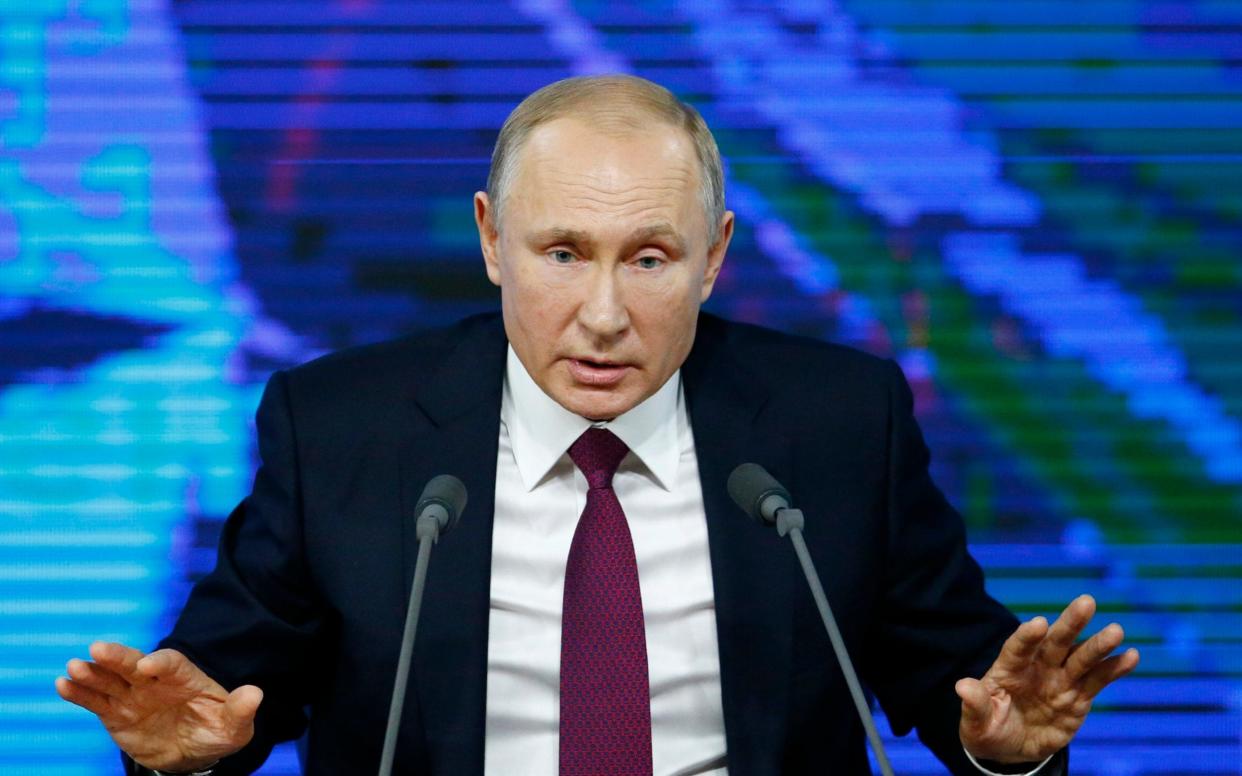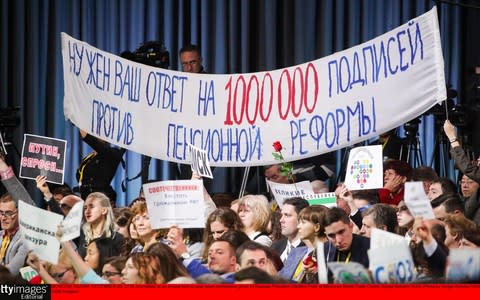Putin calls Salisbury case 'politicised' but fails to comment on Russian agents implicated

Vladimir Putin has slammed the accusations against Russia over the Salisbury poisoning as “politicised” but failed to address the identities of the suspects, who have been unmasked as military intelligence agents.
Kremlin-funded outlet RT asked Mr Putin about the case at his year-end press conference, which lasted nearly four hours, but didn't mention the suspects accused of poisoning Sergei and Yulia Skripal.
Mr Putin previously claimed that Ruslan Boshirov and Alexander Petrov were “civilians” and the allegations against them were “nonsense”. Reporting by The Telegraph and others has revealed them to be GRU officers Anatoly Chepiga and Alexander Mishkin.
“This is a politicised Russophobic approach, it's just an excuse to organise another attack on Russia, if weren't the Skripals I'm sure they would have thought up something else to contain Russia's' development,” Mr Putin said and moved on without addressing his dubious previous claim.
The editor of The Insider, a publication that participated in the initial investigations to uncover Chepiga and Mishkin's real names, was not allowed into the press conference despite having been accredited.
On Wednesday, the United States sanctioned Chepiga and Mishkin, along with GRU agents caught in the act of hacking the international chemical watchdog's headquarters in The Hague and deported.
The UK, United States and other countries kicked out Russian diplomatic staff over the Salisbury attack, and Moscow responded with tit-for-tat expulsions.
Mr Putin said political relations with London were at a “dead end,” but British investment in Russia had increased to $22 billion this year, making it the top foreign investor.
Theresa May, whom he met on the sidelines of the G20 summit in Argentina, should carry through with Brexit, “otherwise it wasn't a referendum,” he added.
Donald Trump's announcement that US forces would be withdrawn from Syria earned praise from the Russian leader, who said they were there “illegitimately”.
Meanwhile, Mr Putin said there was “no reason” for the United States to imprison Maria Butina, who admitted this week to acting as a foreign agent when she helped organise meetings between Russian officials and US conservatives including Donald Trump Jr.
“I can say for sure that she didn't execute any state tasks, whatever she may have said under the threat of 12 to 15 years in prison,” he said.

The Russian president also blasted Washington for its intention to withdraw from the intermediate nuclear forces treaty, warning that the rollback of international arms control was bringing humanity “closer to the edge” of destruction.
When asked about Russian mercenaries in Syria and their patron Yevgeny Prigozhin, known as “Putin's chef” for serving the president during state dinners, Mr Putin insisted he had nothing to do with them and said they could work around the world as long as they weren't violating Russian law.
Three journalists were killed while investigating the mercenaries' presence in the Central African Republic in July.
Mr Putin took questions from dozens of journalists on Thursday in a massive annual press conference known for pageantry and occasionally colourful quotes.
More than 1,700 journalists were accredited to attend what state television called the “main media event of the year”. This number was a new record, as it is most years. The marathon conference has run up to four hours and 40 minutes in the past.
The first part of the event was as always focused on the economy and domestic issues, with Mr Putin answering questions from far-flung regions that rarely gain national attention. He said the country was well out of its recession with 1.7 per cent GDP growth this year, calling for a “breakthrough” to make the Russian economy to the fifth-largest in the world. It is currently outside the top 10.
In the past, the handful of foreign media outlets allowed to pose questions have been selected in advance.
Each year the event has a whiff of medieval pageantry. Journalists waved signs and yelled out key phrases like “Chelyabinsk workers” in a last-ditch attempt to make Mr Putin aware of a local problem, not unlike when Russians would wait in line for a chance to appeal directly to the tsar.
This year, posters larger than A3 format were confiscated so as not to obstruct the television cameras. In the past, attendees have even waved stuffed animals to grab Mr Putin's attention.
State television began a countdown to the press conference 24 hours in advance and covered even minor details about the preparations, such as the different chairs that were being considered for Mr Putin and his press secretary to sit on during the marathon event.
Big stories do occasionally come out of the event. In 2013, Mr Putin dropped a bombshell to a pro-Kremlin publication while leaving the hall, unexpectedly remarking that he would soon pardon imprisoned oligarch Mikhail Khodorkovsky.
The year before the US election, he called Mr Trump a “very colourful and talented man,” continuing an exchange of praise between the two leaders.
After the press conference, Mr Putin, a former KGB agent, was slated to take part in a ceremony for security services day, a long-standing holiday that is still unofficially called “Chekists' day” after the Soviet secret police.

